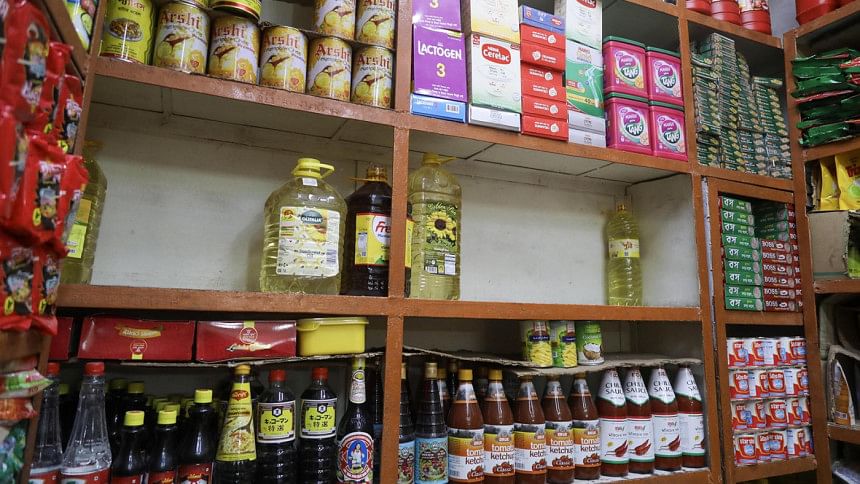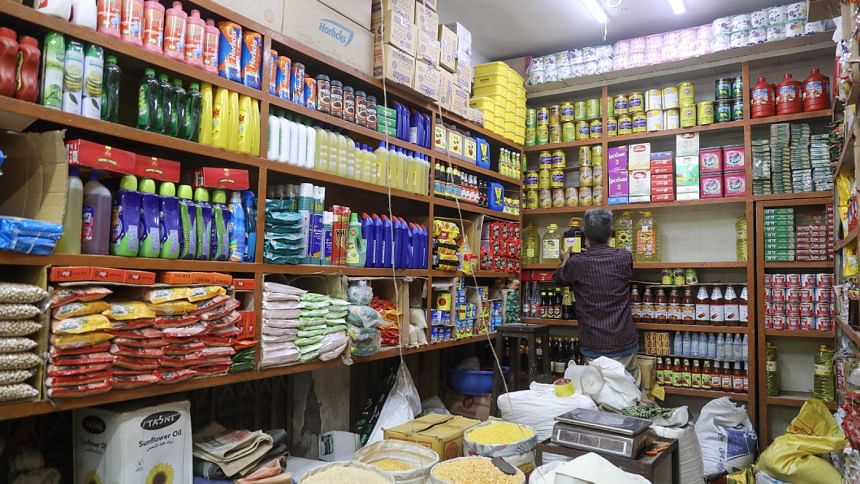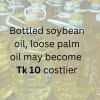Bottled soybean oil still in short supply

Despite a decision by the interim government to hike soybean oil prices nearly three weeks back, many kitchen markets across Bangladesh, including the capital Dhaka, are missing an adequate supply of the key cooking ingredient.
On December 9, the government announced that soybean oil and palm oil prices would both be increased by Tk 8 per litre effective immediately as refiners demanded as much in face of mounting production costs.
And although the move showed promise, with retailers receiving fresh supplies of edible oil in the following days, the availability of bottled soybean oil has gradually declined to almost nil.
The supply chain for soybean oil has been disrupted by an ongoing nationwide strike called by water transport workers demanding a proper investigation of seven murders on a lighter vessel, according to refiners and retailers.
On the afternoon of December 23, seven crewmen of the MV Al-Bakhera were found dead under suspicious circumstances onboard the vessel after it had run aground on a char land alongside the Meghna river in Chandpur.
Following the price hike, the cost of bottled soybean oil was set at Tk 175 per litre while that of loose soybean oil and palm both rose to Tk 157.
The decision to increase these prices came amid a supply crunch for edible oil that stemmed from reduced imports and production despite recent tax cuts.
The government had twice reduced the value added tax on imports of soybean and palm oil since October 17, with the charge having been lowered to 5 percent at present compared to 15 percent previously.
Mohammad Bablu, a retailer in Karwan Bazar, one of the largest kitchen markets in Dhaka, said his shop is facing demand for 400 litres of bottled soybean oil each day.
However, he is getting about 300 litres daily from refiners.

"I thought the supply would be normalised a few days after the price hike. But it did not," he added.
Bablu informed that only two of the country's top edible oil brands are maintaining supply as per demand while all the others have fallen behind.
Hazi Mohammad Mizan, another retailer of the same market, said the refiners are mainly failing to keep up with the demand for bottled soybean oil.
Echoing Bablu, he too informed that maybe just one or two of the big brands are currently maintaining adequate supplies.
Seeking anonymity, a wholesaler at Karwan Bazar said refiners had urged for a Tk 20 price hike at the time when the new edible oil prices were announced as they would otherwise suffer severe losses.
"That is why some refiners are failing to supply products as per demand," Mizan added.
Retailers in Chattogram said they are being supplied just a third of their demand, with many capitalising on the shortfall by charging exorbitant prices for different brands of soybean oil.
Mohammad Shahjahan, manager of Mahin Store at Riazuddin Bazar in Chattogram, said the Rupchanda brand soybean oil is available to some extent, but the supply from others companies is low.
Md Ismail Hossain, a retailer at Kazir Dewri Bazar in the port city, said although supplies of all bottled soybean oil brands had gradually started to normalise, they are still not available as per demand.
There is high demand for one and three-litre bottles of soybean oil, but most refiners are mainly supplying the two and five-litre bottles, he added.
Mohammad Dabirul Islam Didar, general manager (finance and accounts) at Bangladesh Edible Oil Ltd, a major commodity importer and processor marketing the Rupchanda brand soybean oil, said they continued suppling the product as usual after the government raised its price.
He also informed that they were unable to move their imported crude degummed soybean oil from Chattogram to their refineries due to the ongoing strike called by water transport workers.
This situation caused disruptions in the supply chain, he said while adding that they have enough raw materials to continue operations for the time being.
The company operates one refinery in Mongla of Khulna and another in Rupshi of Narayanganj.
"Hopefully the current problem will be resolved soon," Didar said.
Unloading of goods and fuel from mother vessels and their supply through local river routes remained suspended at Chattogram port till yesterday amid the nationwide strike of water transport workers.
The strike, which began at midnight last Thursday, affected only cargo vessels, according to the Bangladesh Water Transport Workers' Federation.
The Daily Star tried to contact Biswajit Saha, director of corporate and regulatory affairs at City Group, which markets the Teer brand of soybean oil, and Md Shafiul Ather Taslim, director for finance and operations at TK Group, a leading importer and commodity processor marketing the Pushti brand.
However, neither responded to our request for comments.
(Jahid Hasan, our district correspondent in Shariatpur, contributed to this report)


 For all latest news, follow The Daily Star's Google News channel.
For all latest news, follow The Daily Star's Google News channel. 









Comments